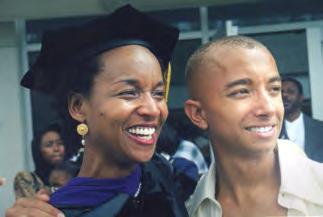
8 minute read
Growing up in Durham when your father’s in prison. BY THOMASI MCDONALD
from INDY Week 2.26.20
by Indy Week
PHOTO COURTESY OF ZADIE WALKER
Break Every Chain
Zadie Walker’s new documentary explores growing up in Durham while your father’s in prison for murder
BY THOMASI MCDONALD tmcdonald@indyweek.com
In 1994, when Zadie Aarie Walker was 10, his father shot and killed the boy’s uncle. The way a cousin later explained it, Calvin McLean Moore’s father had died, and he was supposed to take care of the family farm. He failed to live up to his duties. One day, Calvin’s brother Lonnie confronted him. They both had handguns. Lonnie drew first. Calvin fired first. Lonnie died.
“It was some Cain and Abel shit if I ever heard of it,” Walker says. Moore was convicted of manslaughter and spent four months in prison. He was released on January 27, 1995.
About a year and a half later, Moore gunned down his brother-in-law. This time, he got 25 years. Walker, a Durham native who lives in Brooklyn, never really knew his father, even before he got locked up. He only met him twice: in 2001, at a prison hospital, and on Halloween 2015, a month after Moore’s release.
Walker, a filmmaker, chronicled the second meeting for a documentary exploring how his fatherless childhood affected his life. “I had a hole in my heart, this nagging feeling of incompleteness,” he says. Across the Marsh—the title refers to a colloquial name for Farmers Union, the rural community near Lumberton that’s home to the Moore family farm—offers a stark reflection on the anger and heartbreak common to boys who grow up without their fathers. It’s set against a backdrop of mass incarceration and a city and country engulfed by the crack cocaine epidemic of the 1990s, Durham’s deadliest decade.
(Of the Durham Police Department’s 250 unsolved murders, 95 took place during those years.)
Like too many black kids of his generation, Walker grew up without a father. He went to Durham Academy, but he found a home with the dope pushers in McDougald Terrace.
And as he got older, he began to wonder if he was destined for his father’s fate. They shared the same blood, after all. Walker, too, was wild and confrontational, and when he got angry, his thoughts turned to violence.
Walker never knew his old man, but he couldn’t escape him.
The first time Walker met Calvin—he always calls him “Calvin”—his father was a patient at the now-closed McCain Correctional Hospital in Raeford. He’d gotten into an argument with a fellow inmate over a TV. A guard let the other inmate into his cell. The inmate bashed in Calvin’s skull with a lock in a sock.
The prison wrapped Calvin’s head with a wool blanket. When he healed, strands of wool were left in his brain.
There, Calvin told his 17-year-old son about the second murder: His sister Loretta’s husband was beating her. She wanted to leave him. Calvin went to their place and told him to get out. But the husband told Calvin he’d kill her and him first. Calvin took that as a threat and put a bullet in his head.
He put the man’s body in the back of his truck, drove to a compost site, and burned the corpse. Six months later, he was doing cocaine with a girlfriend, they got into an argument, Calvin threatened to kill her, and she ratted him out to the cops.
This version probably isn’t the whole truth. Walker’s mom told him later that Calvin was seen driving around in the victim’s truck. His cousin told him the killing was planned.
However it happened, Calvin tried to gloss over it. He told his son he was a changed man, that he’d found the Lord. Walker wasn’t convinced.
“Christian, my ass!” he remembers thinking. “I was about to yell out, ‘Guard! This man is crazy!”
He adds: “Every time I share that story, I feel like I’m doing a 30 for 30 for like John Wayne Gacy or Charles Manson.”
Soon after Walker was born, his mother finished her bachelor’s degree at Duke. She went to Brown and earned her master’s, then returned to Durham to go to N.C. Central’s School of Law. Yvette Walker took pains to ensure that her son grew up in a healthy environment. She enrolled him at Durham Academy, a mostly white, affluent private school. They lived in a squat red-brick house on a sloping hill across the street from the law school.
At Durham Academy, Walker found himself having to answer the inevitable question, asked innocently enough: Where is your father?
“It was terrifying to answer that question for white people,” he says. “I walked around for decades not wanting to talk about it. In the black communities, it’s normalized. But the white community feels sorry for you. I would tell them, ‘No, I’m fine. I have my mommy. She loves me.”
The Walkers’ house was just down the street from the McDougald Terrace public housing complex. Then, like now, the Mac was rife with drugs and violence. Walker started hanging out there. He could show a side of himself there that no one at school could see.
“I loved the street. I loved the dope boys,” Walker says. “The edginess spoke to me. They would ask, ‘Who is this lightskinned motherfucker who goes to a private school?’ But my boys would say, ‘Naw, he cool.’ I’d be thinking to myself, ‘I’m crazier than everyone in here.’”
Calvin was like a demon lurking inside of him.
“It’s like I lived a double life because of Calvin,” he says. “When I was at Durham Academy, I didn’t talk about Calvin, but when I was in the Mac, playing on the basketball court, that shit was normal. That was the vibe. It was like, ‘And so what? I ain’t got no daddy either,’ and didn’t nobody care he was in prison for murder.”
Fourteen years after the visit in the prison hospital, Walker and his mother drove to Lumberton to meet Calvin for the second time, this time with a cameraman in tow.
Walker went to UNC-Chapel Hill after graduation, but he only lasted a semester. In 2005, he moved to New York, where he discovered a love of acting while studying at the William Esper Studio.
Zadie and his mother at her graduation from law school in 1999. PHOTO COURTESY OF ZADIE WALKER

He’d made a few attempts at starting the documentary, but the wounds were too raw. With Calvin getting out of prison, though, he took it up in earnest.
“I wanted to get to know him beyond the murderous villain trope that was playing out in my mind,” he says. “I wanted to humanize him because all I could feel was the pain and heaviness of not having him in my life.”
But as they drove to Lumberton, Walker had second thoughts: “I don’t know what I want from this whole thing anymore,” he says in the film. “I’m more interested in basically sticking up for that kid who couldn’t stick up for himself in terms of where has his father been.”
They were supposed to meet at a Walgreens, but Calvin wasn’t there. Calvin’s two sisters were. They drove to their house in Farmers Union and went into the living room. Still no Calvin.
Walker, his mother, and the aunts he’d just met walked into a sunny, wood-paneled day room filled with potted plants. Walker turned around and saw Calvin talking to his mother.
After decades in prison, his father was a broken man, shriveled and gaunt.
“I went through so much anxiety staring at him,” Walker says. “I wanted to yell a primal scream. I was enraged.”
Father and son walked outside, followed by a small, yelping family dog. Calvin wanted to show Walker his new white GMC Sierra, parked under a graying, weather-beaten wooden shed, its chrome rims reflecting the late afternoon sunlight. Calvin asked his son if he wanted to sit in the driver’s seat. Walker climbed in and turned on the radio. Patti Drew’s “Working on a Groovy Thing” was playing.
Calvin reached over and changed the station. The voice of Tasha Cobbs told listeners there was power in the name of Jesus “to break every chain, break every chain, break every chain.” Calvin stared at his son and nodded in time with the lyrics. His son did the same.
Then Calvin hugged him. “I love you, son.” Calvin Moore died in that truck the following September. He drove off a highway and crashed. He was pronounced dead in the ambulance. He died alone.
In the months that followed, Walker wrestled with the concepts of forgiveness and self-acceptance. He says it was important to no longer internalize his feelings of rejection and to abandon narratives of self-sabotage. He wanted to give back— not only to black boys who grow up without their fathers but also to white boys like the ones who attended Durham Academy, whose parents are home but absent because of 18-hour workdays.
He finished the film in January, and he’s begun working with a mental health professional to develop an educational curriculum to accompany it. His scars remain, he says, and they’re deep. But he’s learning to forgive. And that’s a gift he wants to share with the world.
“I want to start the healing process for at least a million teens in single-parent and dysfunctional homes,” Walker says. “I want to inspire people young and old to find forgiveness in their hearts for the shortcomings of their parents.” W
Free Seminar
An Introduction to Functional Medicine And Functional Nutrition: Treating the Cause of your Illness and Restoring your Health.
Presented by: Jessica A. Maschoff, MS, CNSc
FRIDAY February 28, 2020 at 5:30 PM
To reserve your seat please call 919-969-1414.
info@havenmedicalnc.com | Like us on Facebook® www.havenmedicalnc.com
©2020 Haven Medical. All Rights Reserved.









